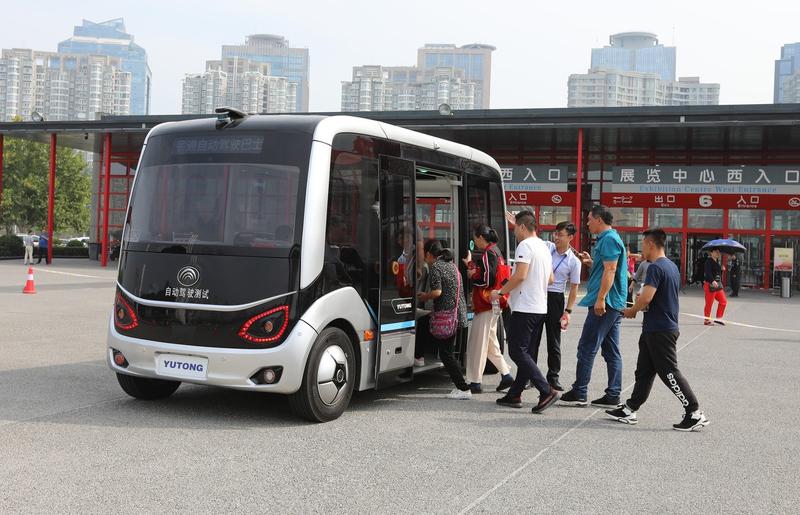 Passengers get aboard a self-driving mini bus for a test at the Zhengzhou International Convention& Exhibition Center in Zhengzhou, capital of Henan province, on Sept 25, 2019. (LIU XU / FOR CHINA DAILY)
Passengers get aboard a self-driving mini bus for a test at the Zhengzhou International Convention& Exhibition Center in Zhengzhou, capital of Henan province, on Sept 25, 2019. (LIU XU / FOR CHINA DAILY)
BEIJING-From carrying out test runs on closed roads to transporting passengers in cities, China's self-driving industry took a big step forward in 2019, attracting more foreign manufacturers.
The Chinese government's guidance and support have promoted the rapid development of this sector, said Gao Qianqian, an official from the China Association of Automobile Manufacturers.
Self-driving cars have to maintain stable connections with base stations to enable monitoring of their operational status, which requires a large amount of data exchange. With the 5G network, the delay is within a few tens of milliseconds, said Han Xu, CEO of China's smart mobility company WeRide.
As the basis for autonomous driving, China's 5G technology, with the advantages of large bandwidth, ultralow delay and large-scale connection, has accelerated its development.
As the basis of the technological advantages, our country has numerous talents, especially in fields including artificial intelligence, big data and cloud computing
Gao Qianqian, Official from the China Association of Automobile Manufacturers
ALSO READ: Clearer view on self-driving cars offered in road tests report
A self-driving vehicle running at 100 kilometers per hour starts braking at least 1.4 meters after recognizing obstacles in 4G networks, while the 5G network can shorten the distance to about 3 centimeters.
The support of the upgraded network has facilitated the autonomous vehicles shifting from road tests to passenger-carrying tests.
In November, a fleet of self-driving vehicles equipped with Baidu Apollo autonomous driving systems developed by Chinese tech giant Baidu, carrying passengers ran on test roads with a total length of 114 kilometers and completed a diverse range of scenarios including cruising and changing lanes.
At the end of last year, WeRide launched a trial run of autonomous taxis, named Robotaxi, in a 144-square kilometer area of Guangzhou, capital of South China's Guangdong province. Passengers can order a taxi via its app and experience a driverless journey.
"As the basis of the technological advantages, our country has numerous talents, especially in fields including artificial intelligence, big data and cloud computing," Gao said.
China has been engaged in the construction of self-driving infrastructure to enhance safety and efficiency in test rides.
Beijing added a new area of 40 square kilometers for testing selfdriving cars carrying passengers on Dec 30. The city has opened 151 roads with a distance of about 503.68 kilometers for autonomous driving, ranking first in the country.
Last May, Beijing's tech hub Haidian district began constructing a 100-square-kilometer demonstration area for self-driving vehicles.
The area will be a place to develop smart connected cars and smart transportation featuring multiple scenarios, cloud management, simulated tests and data support. Companies and researchers would be able to test commuting, logistics and delivery technologies as well as those related to road cleaning, said Dai Binbin, head of the Haidian district government.
In Southwest China's Chongqing municipality, a demonstration area for 5G-based autonomous driving, including a closed test area covering more than 470,000 square meters, was launched in August.
Besides the construction of infrastructure, cities including Beijing, Shanghai and Chongqing issued policies and license plates for autonomous vehicles to assist in the research and development of the self-driving industry.
In September, several tech companies including Baidu obtained commercial licenses for self-driving vehicles issued by Wuhan's transportation department, followed by Beijing, which issued 40 license plates for Baidu's autonomous cars carrying passengers later in December 2019.
"I believe China's driverless commercial era may come faster than we planned because we are taking the lead in infrastructure efficiency and capabilities around the world," said He Xiaopeng, chairman of China's electric vehicle maker XPENG Motors, at the Boao Forum for Asia annual conference in March 2019.
It is estimated that the revenue from car sales and related services of autonomous driving in China will exceed $500 billion by 2030, according to experts at the second China International Import Expo held in Shanghai in November last year.
The Chinese market has attracted increasing numbers of international car manufacturers to develop their self-driving sector here, said Gao.
"China is the world's largest market for new cars, and the space for large-scale application of new products and technologies of this industry in the future is considerable," she said.
At the 2019 World Intelligent Connected Vehicles Conference held in October, German automaker BMW obtained license plates for intelligent connected vehicles issued by the Shanghai local government.
READ MORE: Pushing pedal to the metal for more self-driving cars on roads
Thomas Müller, executive vice-president of Volkswagen Group China, said at the 2019 World Internet of Things Exposition held in Wuxi, East China's Jiangsu province, that Audi would focus on expanding China's smart car market and developing self-driving technology to meet the needs of the country's consumers.
Audi's innovation in China would become its basis to develop self-driving vehicles, said Müller, adding that a research center had been set up in Wuxi last year to provide support for the testing of its self-driving vehicles.
But Gao also noted that despite a fruitful year of autonomous driving for Chinese companies and their international partners, there is still a long road ahead for the industry's commercialization, with challenges including the improvement of regulations, the ability to control costs, as well as the sustainability of its commercialization value, to be overcome.


